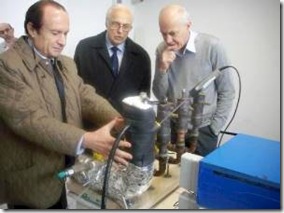Cold Fusion (or not?)

Cold Fusion Machine Recently I have seen a few interesting articles on viable cold fusion; the combining of atoms at room like temperatures to create boundless energy. Now after a bit of research I have discovered the are a few proponents [believers] and a lot of skeptics. The jury is not out, but just in case the technology comes in as a winner here is the latest and it happens to be a working machine.
Andrea Rossi and Sergio Focardi, researchers at the University of Bologna in Italy, claim to have constructed a working and economically viable machine. Two versions of the machine been demonstrated and appear to produce about 15 times more energy than consumed by fusing together nickel powder and hydrogen:
- Initial models fused nickel and hydrogen, turning 292 grams of 20o water into hot steam, in the process generating 12.4 kW of energy using just 400 watts of input power
- Later models produce 4.69 kW using 330 W of input power, although in a much smaller foot print and weighing only 4 kg.
The machine consists of a stainless steel reactor filled with nickel powder with water and hydrogen inlet pipes. The reactor is placed in a copper pipe and activated by current flowing through a resistor wrapped around the outside of the pipe. At the correct temperature the reaction begins. Copper is produced as a by product.
Given the potential of the technology, I would have expected a lot more interest and hype. With this missing you do have to consider the possibility that something is not right and the machines are not working as promised. Time will tell.
December 2012 - Been doing a some research to see if anything has come of this. To date not a lot. Articles abound - some say it works, some say it’s a scam; I suppose we will still have to wait.